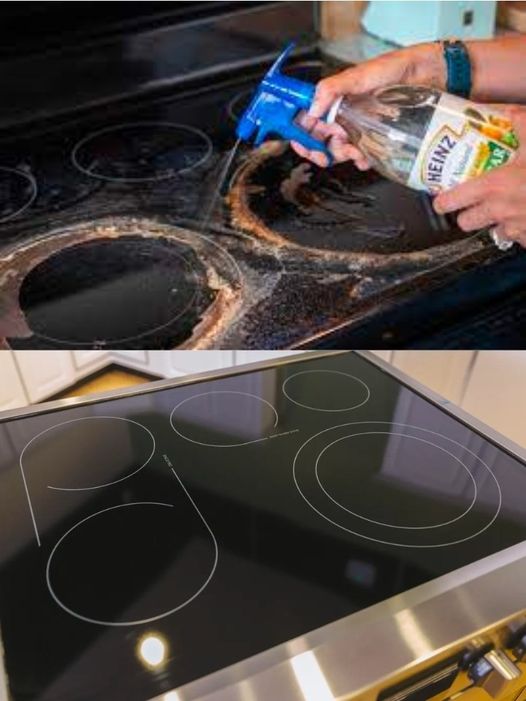ADVERTISEMENT
**The 5 Effective Ways to Clean Your Glass Stovetop**
A glass stovetop adds a sleek and modern touch to any kitchen, but keeping it clean and shiny can be a challenge. Spills, stains, and grease splatters are common, and if not cleaned up properly, they can make your stovetop look dull and unattractive. The good news is that with the right cleaning techniques and tools, you can keep your glass stovetop sparkling without much effort.
In this article, we’ll walk you through five effective ways to clean your glass stovetop, whether you’re dealing with light smudges or stubborn, burned-on food.
### **1. The Classic Baking Soda and Vinegar Method**
This simple yet powerful combo can tackle most types of stains and grime on your glass stovetop. Baking soda is mildly abrasive, making it great for scrubbing without scratching the surface, while vinegar helps to dissolve grease and food residues.
#### **What You’ll Need:**
– Baking soda
– White vinegar
– Warm water
– A microfiber cloth or sponge
#### **How to Clean:**
1. **Sprinkle Baking Soda**: First, ensure the stovetop is cool. Sprinkle a generous amount of baking soda over the glass surface.
2. **Apply Vinegar**: Fill a spray bottle with white vinegar and spritz it over the baking soda. You’ll notice some fizzing action, which means it’s working to break down the grease and grime.
3. **Let It Sit**: Allow the mixture to sit for 10–15 minutes. For tough spots, you can cover the area with a damp cloth soaked in warm water to let the mixture penetrate deeper.
4. **Scrub Gently**: After the waiting period, use a soft cloth or sponge to scrub the surface gently. Pay special attention to any stubborn spots or burns.
5. **Wipe Clean**: Finally, wipe down the stovetop with a clean, damp microfiber cloth to remove any residue.
This method is ideal for regular cleaning and for removing moderate buildup.
### **2. Commercial Glass Stovetop Cleaner**
If you want a more specialized approach, commercial glass stovetop cleaners are designed to effectively clean tough stains, grease, and residue without damaging the surface.
#### **What You’ll Need:**
– A glass stovetop cleaner (make sure it’s specifically designed for glass stovetops)
– A microfiber cloth or soft sponge
#### **How to Clean:**
1. **Read the Instructions**: Each brand may have slightly different instructions, so be sure to follow the product’s guidelines.
2. **Apply the Cleaner**: Once the stovetop is cool, apply a small amount of the cleaner to the surface.
3. **Buff and Scrub**: Use a microfiber cloth or a soft, non-abrasive sponge to buff the cleaner into the surface. For stubborn spots, you may need to apply a little extra pressure, but be gentle to avoid scratches.
4. **Wipe Away Residue**: After cleaning, wipe the stovetop with a damp cloth to remove any leftover cleaner. Buff the surface with a dry cloth to restore its shine.
These cleaners are formulated to remove grease and grime without leaving streaks, making them a great option for quick, effective cleaning.
### **3. The Power of Lemon**
Lemon isn’t just for cooking—its acidity makes it a fantastic natural cleaner, especially for glass stovetops. It helps break down grease, remove stains, and add a fresh scent to your kitchen.
#### **What You’ll Need:**
– 1 lemon
– Baking soda
– A microfiber cloth or sponge
– Warm water
#### **How to Clean:**
1. **Cut the Lemon**: Slice a lemon in half. Squeeze the juice from one half directly onto the glass stovetop.
2. **Sprinkle Baking Soda**: Sprinkle a thin layer of baking soda over the lemon juice. The combination of the acid from the lemon and the mild abrasiveness of the baking soda will work wonders on grease and stains.
3. **Let It Sit**: Allow the mixture to sit for 5–10 minutes to soften any debris or stuck-on food.
4. **Scrub**: Using a soft cloth or sponge, scrub the stovetop gently to lift the grime. The natural acidity of the lemon should help dissolve the grease and stains.
5. **Rinse and Wipe**: Wipe down the stovetop with a damp microfiber cloth to remove the residue. Dry with a clean cloth for a streak-free shine.
Lemon is a great eco-friendly alternative if you prefer to avoid harsh chemicals.
### **4. Use a Razor Blade for Stubborn Spots**
Sometimes, no amount of cleaning solution will help with those stubborn, burned-on food stains. In these cases, a razor blade can be your best friend, as long as you use it carefully.
**What You’ll Need:**
– A razor blade or scraper (make sure it’s specifically for glass stovetops)
– A cleaning solution (baking soda, vinegar, or commercial cleaner)
– A microfiber cloth
For Complete Cooking STEPS Please Head On Over To Next Page Or Open button (>) and don’t forget to SHARE with your Facebook friends
ADVERTISEMENT
